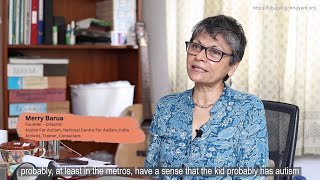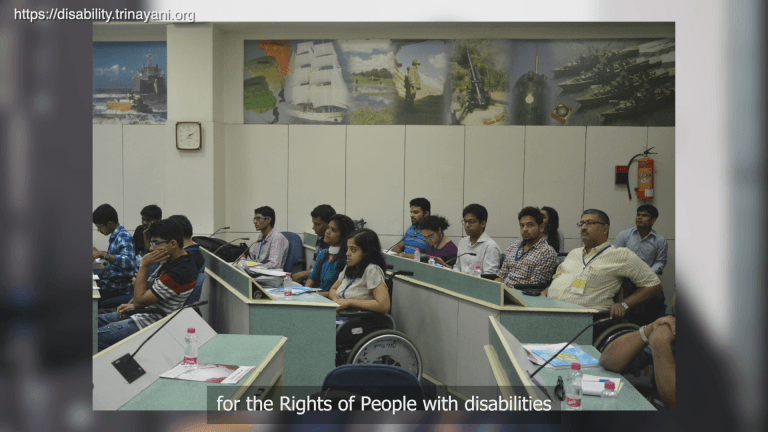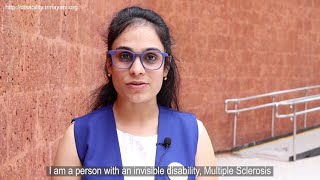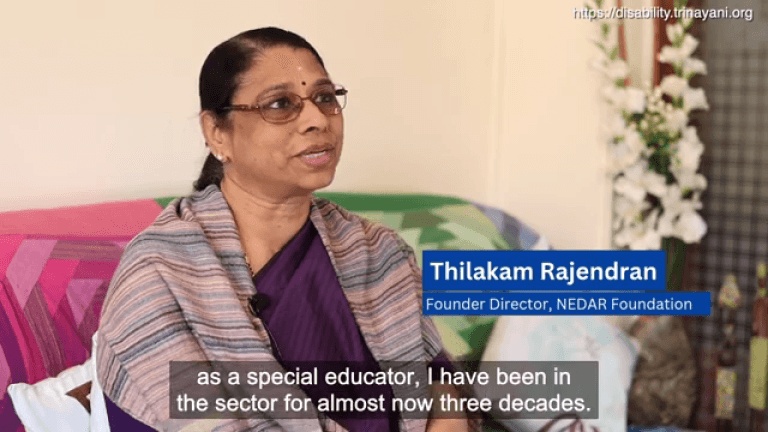Jayshree Raveendran’s Journey in Access and Disability Inclusion
This film features Jayshree Raveendran, Founder of Ability Foundation, Chennai, as she shares her journey and insights into disability advocacy. With years of experience, Jayshree has witnessed significant progress in the field but emphasizes that much more needs to be done. Her passionate storytelling, along with real-life examples, underscores the importance of inclusivity and the ongoing efforts required to break societal barriers for people with disabilities in India. This film offers her unique perspective on the evolution of disability advocacy in the country. Through initiatives like the CavinKare Ability Awards, the Ability Film Festival, and the Success & Ability magazine, Jayshree and her team at Ability Foundation continues to drive change.
Give us your thoughts on the current state of disability advocacy.
Well, I see a lot of things that have happened which are the rewards of labor, I’m very happy about that.
Of course a lot needs to be done, but when you look back, Ability Foundation existed for 27 years now, and when you look back at that time, surveying people around me, to what we have today, it’s a beautiful feeling.
Way back then, there was no disability sector, there was no one blind person knowing anything about a deaf person or a deaf person knowing anything about a spinal…whatever that may be.
There was no collective US.
There was no feeling that a person with disability was a recognised entity unto himself or herself with the same joy, sorrows, happiness, whatever, ambitions, whatever anybody any human being need to achieve, that was not there at that time.
So now it has come to a great extent.
At least people are aware that there is a sector, a marginalized sector called people with disabilities.
Has your hearing impairment affected the advocacy work that you do?
I was very fortunate that I was never told I could not do something because I could not hear, not by my parents, not by my brother, not by my husband, no one.
I was one of those fortunate few, but way back when I was an employed person, I worked in several spheres of life.
I was an assistant professor for some time, I was an advertising creative writer for some time, various places that I worked, I used to wonder where the country’s people with disabilities were, why I have not met them.
Are there no middle class people like you and me, who are disabled?
Are there no hopeful parents wanting the best for their children?
Are there no educated people with disabilities who wanted good jobs?
Why were they invisible?
Thoughts like that…I resigned from my job to jump into this, not knowing what to do but knowing what not to do.
That was the only thing that guided me at that time.
Then I met lovely people like Sruti Mohapatra, like Javed Abidi, like Anuradha Mohit, all of us were one small, four-five member, people trying to make possible, sector, something that you call sector to create the cross-disability culture.
I remember I wanted to start Ability Foundation with a magazine.
And since I had not moved with anyone with disability in my college days or student days, I wanted to know what it was they would expect from a magazine like this, so I called people from various uh sectors of disability and in those days we had a tape recorder, 2 – in – 1 or whatever, put that in the middle of the table and just let them talk.
To my surprise, the blind person had never met a deaf person, so he had never met a person with hemophilia, no one with a, no one knew at that time.
And they were meeting for the first time and there began a beautiful group at that time.
What are the challenges you have faced in your advocacy work?
Every small step is a mountain to be climbed and the challenges come from every side.
First of all, there was lack of awareness, lack of sympathy, stereotyped images, myths, all of which had to be shattered, all these put together, meaning the so-called aware, educated, well-to-do person of today did not know about the potential of a person with disability.
There was always the element of pity, the element of ‘you cannot be independent’, “you always need somebody’s help”, that kind of thinking.
And even today, there exists either pity or superhero concept, “I’m so inspired by you” concept, both of which are not right.
Can you share some real-life examples of how Inclusive practices in education have positively impacted the lives of people with disabilities?
In the field of education, there’s so much to be done.
There’s natural assumption that people with disabilities need something special and they’re pushed away to a special school.
What we’re trying to say is that special education is a service, it’s not a place.
Special education has to be made available in every school, every college, where a person with disabilities must be given a level-playing field.
Well, as far as we, at Ability Foundation are concerned, we’ve had a reasonable amount of change in perspective and stereotypes in higher education.
In high school, some of the schools have been sensitized and the principals are open to accepting children with disabilities and there are also a few schools which have resource centers, permanent resource centers, in case a person with disability is admitted.
There was a few experts there to take care of them and advise.
As far as college education is concerned, we have marvelous interaction with Sathyabama University, which is one of the premier universities in India.
The chancellor of the university was sensitized in a flash of a minute, very sensitive human being.
So, the moment we sensitized her, she was all for it.
Today, we have about 50 seats allotted to us every year.
We had a person with disability who has just finished school, with the right marks of course, all the other things being equal, the person with disability is taken on any stream of degree, graduate course of his or her choice.
There is no being told, there is no underestimating of that person’s talent or potential.
So you’re given your admission in any stream that you want to.
All the labs are on the ground floor.
Uh there is a sign language interpreter in every classroom.
And there is a software on the laptop for every blind person.
And blind people are the only ones who in the hostel are allowed laptops.
So many things, so you’ll find wheelchair users, you’ll find blind people, you’ll find deaf people, all passing out every year, so that’s a beautiful thing that we have.
What is currently happening in Ability Foundation regarding the employment of people with disabilities?
The employers when they find that they do not stand to lose out on any way, by employing a person with disability, are really open to employment as long as they find that they don’t have to compromise on qualifications on skills or anything else, they are willing to try.
It’s unfair to say that disability is something to do with mediocrity.
You can’t do that.
So, we, that is the philosophy we work with.
Today we have around 225 odd companies who keep coming back to us for people to employ.
But the strange thing is, persons with disabilities themselves are reticent, but it’s been a beautiful journey.
It’s tough, it’s frustrating, I wouldn’t say no, but it’s happening now, more so than before.
The challenges very much exist, but I would rather see the cup as half full than half empty.
Do you have sign language users in Ability Foundation? What are your views on sign language?
You cannot deprive a person of one’s own comfort.
A language is a language, whether you sing or jump or dance or communicate or sign. You need to communicate, that’s the basic fundamental value.
So today, at least in India we have a uniform sign language called Indian Sign Language, which was not there earlier.
I do believe that this is not just for deaf people, per se, it is, could be for the late deaf and it could be for the elderly.
It could be, I have so many people, college students who have come to me saying they want to learn sign language because they can sign secrets in class.
It is so beautiful, that’s how you learn.
So we’ve had sign language classes with the police academy, with the judiciary, with various people and we believe that every public function should have an interpreter, irrespective of the fact there is a deaf person present in the audience or not.
There may be, there may not be, but that’s not how you calculate.
Definitely I am strong advocate for sign language.
What is your vision for an inclusive society and what steps do you think are still needed to achieve it?
For me, inclusive society, is really society of human beings.
The way I visualize, I see people working hand in hand, working shoulder to shoulder, being friends.
Don’t look at the disability first, you look at the person as a person first and the disability next.
And as a friend, you offer whatever you need, in terms of creating a level playing field, eh, that is my vision.
A vision where every employer says that I am proud to employ persons with disabilities, where every school says that they’re open to children with disabilities, where there is no discrimination.
Inclusion doesn’t mean just putting a bunch of people together, with and without disabilities.
True inclusion means taking care of each one’s sensitive requirements, providing the reasonable accommodation that each human being requires.
That is true inclusion.
So, that is, today inclusion is a much doubted word without people really doing that.
So, can’t say ‘I have an inclusive classroom’ just because you have blind people or deaf people as students.
So, my vision there lies…level playing field.
Any human being when he or she lives long enough will one day acquire a disability.
With age, you may hear less, or see less, or walk less, whatever the case may be.
Therefore when you prepare society for people with disabilities, you’re actually preparing society for all citizens, the country for all its people, that’s how it is.
*
Could you tell us about Ability Fest and your magazine “Success and Ability” along with how you’re using it to change perceptions?
Ability Foundation began with the concept of a magazine way back in 1995.
I was surrounded by magazines and magazines on every reason, on beauty, on politics, on filmstars, you name it, on business, there was a magazine on the subject.
So I wondered why a magazine on people with disabilities was missing.
Of course, occasionally a magazine brought out a person with disability, wrote about him or her, glorifying the fact that he or she even though had a disability was doing such such a thing.
But where was the magazine which offered some consolation, some comfort which told people that it was fine to have a disability, nothing wrong, nothing happened to you just because you had a disability.
You’re, you had every right to live a whole life like a whole human being.
Not caring for…not feeling sad that you did not have something else that somebody else had, where was a magazine like this?
So, thinking that time I began a magazine called “Success and Ability”, but I must confess that I had more discouragement than encouragement at that time.
Society itself was very backward thinking as far as people with disabilities were concerned.
They failed to see how a magazine could be termed as service.
A service was something that you saw in front of you.
You donate something or you educate somebody – that was service.
But people did not understand that help came at various levels, the physical level, emotional level, psychological level, friendship level, so many levels of help that can in life.
So therefore, as I said before, not knowing what not to do, then knowing what to do, I took the plunge with the magazine.
And doing the magazine has been amazing journey, a roller coaster ride, as a editor, as a publisher, as a distributor, as everything all rolled in one.
And people who came back to me after reading the magazine saying they wanted to do something for the foundation. That was the beauty of the whole thing.
And it brought together, it helped, I would say, to create the sector as a sector, a disability sector.
At least people from each area of disability came to know.
At that time, we published this magazine, a physical magazine for several years.
Today everything has changed.
After COVID, the whole world has become different world.
And therefore today, it’s an online digital magazine which is completely accessible, no matter what your disability.
You can read, you can hear, you can listen, you can do whatever you want, it is your choice, that’s now available.
So, these are the ways we promote advocacy, these are the ways we break stereotypes and dispel myth.
Apart from magazine, we have a very very beautiful program called the CavinKare Ability Awards, which also is the one more step in the same direction, which does not hero worship anyone, which does not idolize anyone as a Superman or super human hero, superhero, sorry, but just lays to the public the kind of difficulties that so and so had to go through, towards success.
We don’t call the recipients of the awards as winners.
There are no winners or losers here.
Each one, if you take it that way, each one is a winner.
But there are only so many awards per year that we give out and that.
Now it has been almost 20 years of the awards and the kind of people we meet, the kind of things that they have gone through, some rags to riches story, some people saying that they were asked to die by the doctors and still have done work they have done.
When they…people come at large and watch these beautiful people on stage expressing themselves. That is where sensitisation happens.
At Ability Foundation we have never believed in the militant attitude, in fighting.
We believe change will not happen that way.
We believe that change will happen when you see the reason for it to happen.
You cannot be forced to change yourself, and therefore these programs which are enjoyable, which are glitzy almost, the upbeat programs where everyone is treated so beautifully, people come and enjoy a beautiful evening’s program and in the bargain get sensitized.
There’s the awards.
Well, if I have to go back, look into history, we have done 3 inclusive programs.
First one was then when Ability Foundation was 1 year old, we wanted to celebrate that, so we brought out a classical dance program called Sangamam, where half the dancers were blind and there was me and there were two professional dancers, very well-known dancers in the field, all put together as a group, come out with a beautiful classical dance program with no one in the audience knowing who was disabled, who was not.
That’s what we do.
Things like that that we do.
Then came Samara which was a fashion show where Aishwarya Rai came and participated, Usha Uthup came and anchored the show.
A whole lot of people, children from 7 year old to senior citizen, 70 years old, people with disabilities, people without disabilities, professional models, film stars, everyone, all put together, but each and every garment they wore was stylized and made for that occasion by a fashion designer, choreographed by a professional choreographer, was all a professionally done program called Samara.
That was a lovely thing, people came asking me if they could sit next to Aishwarya Rai, if they could touch Aishwarya Rai or whatever.
But I told them, who knows, you may have the luck, and we don’t know.
They didn’t know what to expect.
We don’t fundraise through celebrities.
We don’t use celebrities to propound the philosophy, no.
Hugging somebody and saying, ‘see I am empathetic’, no we don’t do that.
But we use celebrities, the’ve power to influence change, so that they too are sensitized and they sensitize others in the bargain.
And people come to the auditorium wanting to view a lovely program, enjoying the program and getting sensitized to the fact there were so many people with disabilities doing such beautiful things.
Next was called Samhita, it was an art show.
We had well-known artists from across India, along with foot artists, mouth artists, artists with various disabilities, all put together in a gallery with no art lover knowing which one was by a person with disability or by a professional without disability.
So by doing shows like this, thats what we do to sensitize the public, because we believe India has enough problems as a country, when you look at a person with disability as one more problem, your first impulse is to turn the other side.
But when you look at the person as a potential, a person who can do so many things, then you look at it differently, that is our line of advocacy.
Same that we did with Ability Fest, the film festival.
It was an international film festival, where we get films from across the globe.
People just sent their films from everywhere and it is always held in a mainstream theater.
It is never held in a preview show theater, no, so that anyone who walks around in the theater, it is a multiplex, where you see something happening, you walk in.
That is how such beautiful films that we got, people came to understand so many aspects and in the bargain, we also sensitized the experts in the field, everyone, people with disabilities themselves who could learn to change their own thinking and achieve better, have more ambitions, which is so important.
And one of the good things that has come up about, with the festival, once two editions of the festivals were done, Satyam theater, which is a mainstream theater, every Wednesday always has subtitled films.
Every Wednesday without fail, whatever the film, whatever the language, has captions, subtitled.
So, that was there that happened.
And the other thing that happened there was the audio description for the blind.
The first audio description we did was Taare Zameen Par by Aamir Khan who just gave us the film for audio describing and there were people from the film fraternity who all came and watched the movie and said this is the first time we’re really enjoying a movie to such a total extent.
Just as for a deaf person, dialogue is not everything, for the blind person, only dialogue is not everything.
So much beauty happening in the films which you need to know, so, we do things like that and it’s been a beautiful journey.
I don’t know what we will come up with next but this is our role.
Ability Film Festival, Ability Foundation, accessibility, advocacy journey, awareness, Breaking Barriers, CavinKare Ability Awards, Chennai, community support, disability activism, disability advocacy, disability inclusion in India, disability rights, empowerment, equality, inclusion, inclusive society, Jayshree Raveendran, leadership in disability rights, media and disability, Policy Change, progress and challenges, real-life stories, representation, Social Change, Social Impact, Success & Ability magazine
Dive Deeper: More on Disability
Learn about the most common inquiries surrounding disability, education, legislation, accessibility, employment and other sectors related to disability.


Playlist
Access & Inclusion


Playlist
Adaptive Sports


Playlist
Alternative Communication Methods


Playlist
Autism & Neurodiversity


Playlist
Blindness & Adaptations


Playlist





